Imposter Syndrome: The Rise of Impersonation Scams
By Victoria Strauss | October 27, 2023 |
The current self-publishing industry has its roots in the mid-1990s, when three startups–Xlibris, Trafford, and AuthorHouse–began selling digital publishing services to individual authors.
(Bear with me: I’m getting to the subject of this post!)
Along with similar provider iUniverse, these companies later incorporated under the umbrella of Author Solutions, Inc. (AS). A pioneer in the assisted self-publishing space, AS also pioneered the hard-sell sales tactics, deceptive advertising, and expensive junk marketing techniques that dominate this publishing segment. (Junk marketing: marketing services that are cheap to provide, sold at a large markup, and are of dubious value for book promotion.)
Sometime in the mid-2000s, AS began outsourcing most of its sales and production to the Philippines, where there is a large, educated, English-speaking work force that’s also less costly than equivalent workers in the USA. Inevitably, some of the more entrepreneurial-minded of these staffers, seeing how lucrative it was to convince writers to spend large amounts of money to publish and market their books, decided to set up their own self-publishing enterprises to poach authors away from AS and other companies.
When I first started discovering these AS knockoffs (here’s my first blog post about them), they were mostly just selling Author Solutions-style publishing and marketing packages–although exponentially more overpriced and deceptively advertised than the original, with terrible customer service and the books and other products far more likely to be of poor quality (and that’s when they didn’t just take the money and run).
In recent years, though, their numbers have exploded—there are hundreds of AS knockoffs in operation now, and more cropping up all the time—creating fierce competition for customers in an increasingly crowded field. This has driven them to adopt ever more brazen practices to support their quest for writers’ cash: forging documents and contracts from Big 5 publishers, selling completely fictional products such as “book insurance”, engaging in elaborate front operations involving multiple fake businesses, and impersonating reputable literary agents, publishers, and movie companies.
Impersonation scams especially have become common over the past couple of years, and they can be quite convincing. In this post, you’ll find examples of the three types of impersonation scam you’re most likely to encounter, along with a look at the telltale signs that can identify them.
LITERARY AGENT/AGENCY IMPERSONATION
You’re most likely to be targeted by an impersonation scam if you’re a self-published or small press author—but any writer may be approached. The scam usually arrives out of the blue, via an email solicitation like this one:
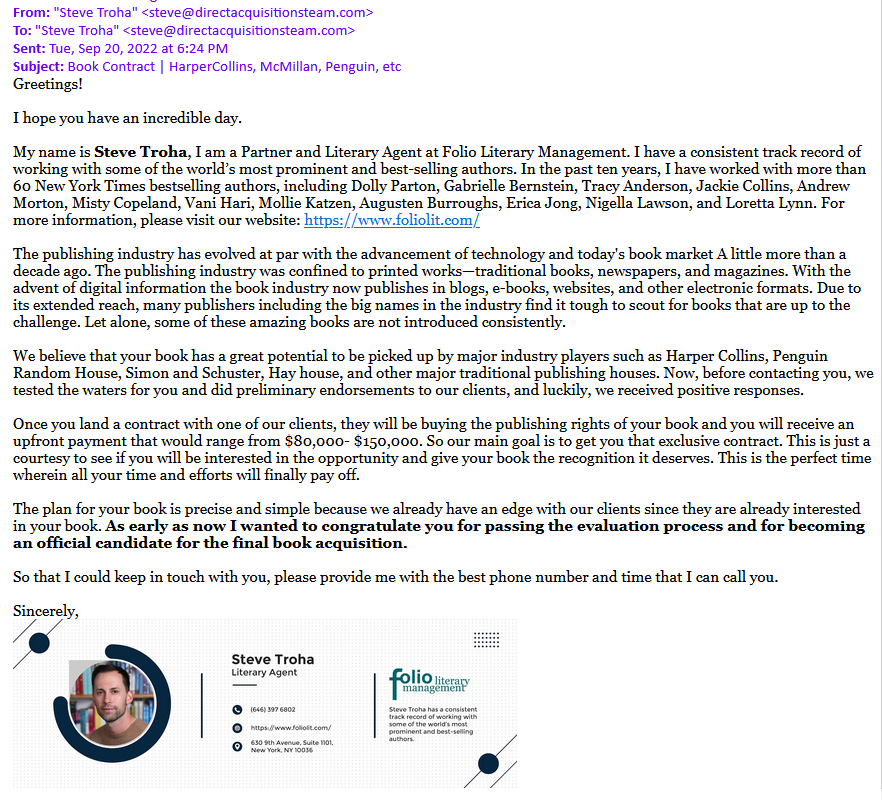
Steve Troha is a real agent with a real agency–Folio Literary Management—so if you Google him, you will get authentic results. The website URL in his signature card is the real Folio website. However, there are multiple red flags in this email.
- A real literary agent (or publisher, or film company) is highly unlikely to contact you out of the blue with an offer ready to go—even a provisional one. Agents don’t “test the waters” for writers they don’t represent.
- It’s a mass email (you can tell because the “from” and “to” addresses are the same). A rare, genuine contact from a literary agent would come to you personally. You’d be addressed by name, and your book title would be mentioned—neither of which this email does.
- A real agent with Folio Literary would be reaching out from the Folio email address (@foliolit.com)—not from an alternative address (@groupof acquisitions.com) that has no discernible connection to Folio.
- The promised “upfront payment” (a real agent would say “advance”) amounts are preposterously inflated. Advances for first-time authors are more likely to fall in the $5,000 range than the $150,000 range. Scammers often try to turn writers’ heads with big money promises…which they can then argue will more than offset whatever large fee the writer is asked to pay.
Another sign of scam: an alert on the front page of Folio’s website. They’re aware their agents are being impersonated, and like a number of other targeted agencies, have posted a warning. (The absence of a warning shouldn’t be taken to mean there’s no malfeasance going on: the agency may not be aware it’s being impersonated.)
Here’s another one.
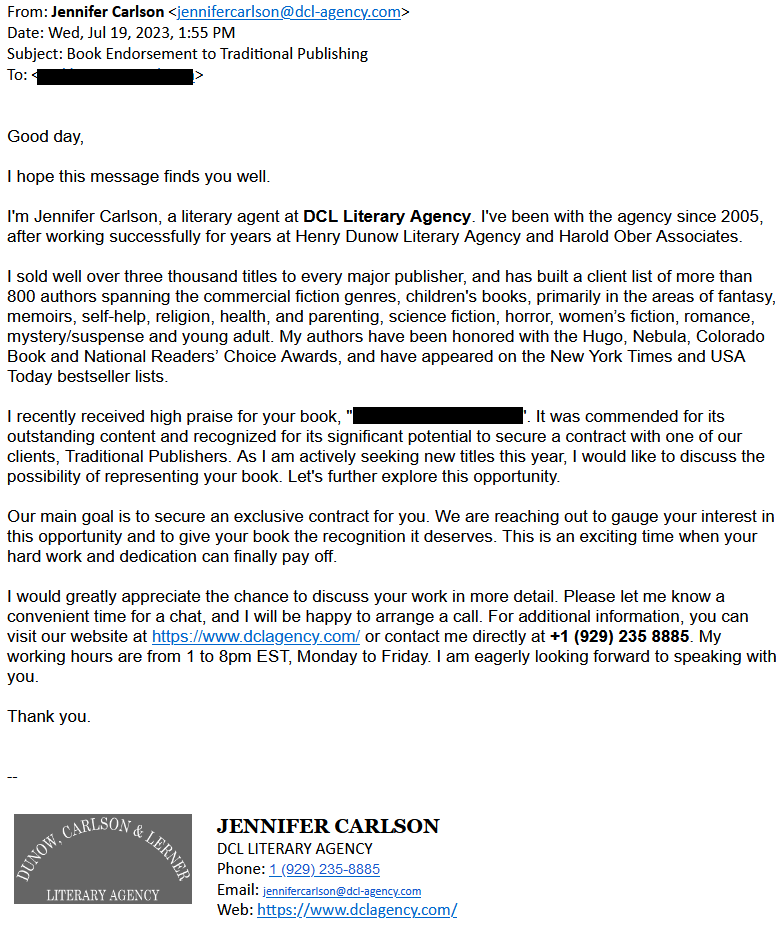
Again, Jennifer Carlson really is a literary agent with DCL Literary Agency, which a websearch will confirm. The email is personalized to the author, with their email address and book title (both of which I’ve redacted). The link to the DCL Literary website is genuine.
As with the fake Folio email, though, solicitation is a warning sign: busy literary agents don’t generally cold-call writers. In addition…
- The tone of the email is off. Would an established agent with an extensive track record really spend three paragraphs pitching her credentials as if she were completing a job application? Seems unlikely. Agents expect you to pitch them—not the other way around.
- There’s also the vagueness about how she happened on the author’s work (who exactly furnished the “high praise”? A rare, real contact from an agent would say) and a telltale lapse in the fourth paragraph: agents don’t describe publishers as “clients” (an agent’s clients are authors, not publishers). For that matter, a real agent wouldn’t use the term Traditional Publisher, since it’s a given that that’s the kind of publisher an agent works with.
- The email address, @dcl-agency.com, looks authentic–but it’s fake. Per its website, the real DCL Literary’s email address is @dclagency.com (no hyphen). Scammers often use email addresses that look like real ones, but include small differences; it’s always wise to double check.
- Also worth checking: when the email domain was registered. In this case, it was registered on July 14, just 5 days before the email was sent–which doesn’t really fit with an agency that has been in business since 2005.
Like Folio, DCL has a scam warning on its front page.
Other warning signs to watch for (this applies to the examples below as well): a gmail address (a genuine contact will use the agency’s email domain), English-language and grammar lapses (since most impersonation scams come from overseas—though thanks to ChatGPT, this is less likely to be a marker these days), a list of things supposedly required by publishers other than a manuscript and synopsis, such as professional reviews, professional editing, a query letter, or a book trailer (publishers are interested in none of these things, and agents don’t demand them), and any mention of fees or purchases (other than commission).
As with all scams, the ultimate aim is money. The writers who received the emails above were informed by the fake agents that their books had to be edited to meet publishers’ standards, and referred to a “trusted” editing firm…aka the scammer behind the curtain. The fee: $3,500 and up.
A different, but related scam: the entirely fictional literary agency.
PUBLISHER IMPERSONATION
Major publishing houses are even less likely than established literary agents to contact authors out of the blue. So if you receive an email like this one, be very suspicious.
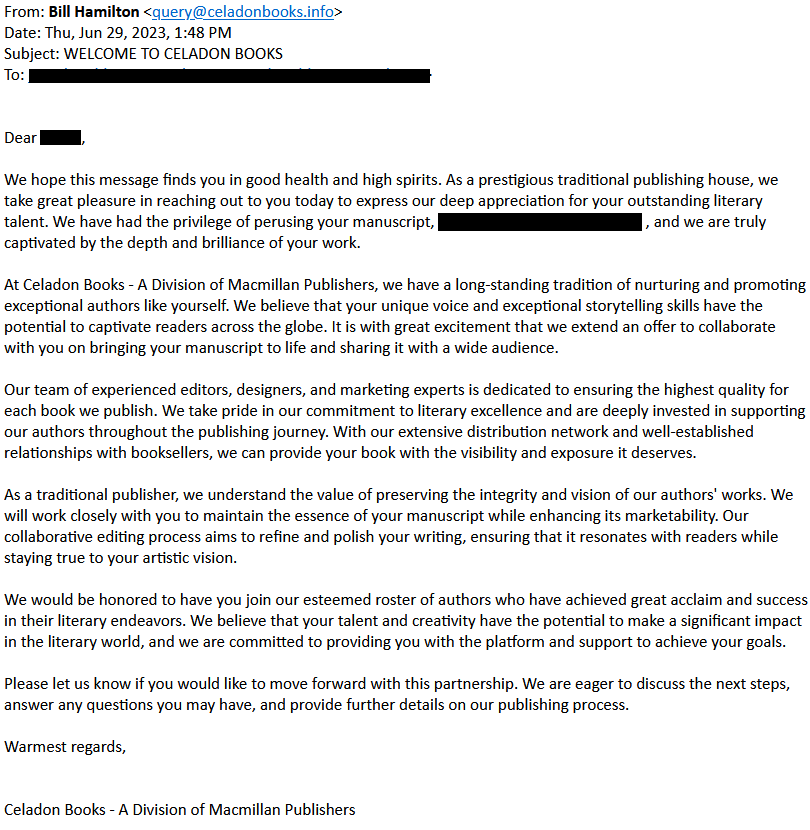
Here again, there are elements of verisimilitude, just in case the recipient does some websearching. Celadon Books genuinely is an imprint of Macmillan. Bill Hamilton really does work there, as Executive Editor (this can be confirmed on the Celadon website). And the email is personalized, with the author’s name and book title.
However, even beyond the red flag of solicitation, plenty of caveats apply.
- The email reads like Celadon is competing for a job opening—not very plausible, given that authors compete for publishers, not the other way around. Plus, like so many Big 5 imprints, Celadon acquires exclusively through literary agents (as it states here); it has no need to approach authors directly.
- As in the fake Jennifer Carlson email, the term “traditional publisher” is a marker: big publishers won’t identify themselves that way, since they assume you already know.
- There’s also the telltale vagueness about how Celadon acquired the “privilege of perusing” the author’s manuscript. Any legitimate contact would be specific about where they saw or heard about your work.
- This solicitation too boasts a fake email address. The real Celadon address is @celadonbooks.com—again, confirmable at its website. That email domain was registered just this past April…not very plausible for an imprint founded in 2017.
Like so many of the literary agents who are being impersonated, Celadon is aware that its name is being misused, and has placed a warning on its website. Other Big 5 publishers have as well. Here’s HarperCollins. Here’s Hachette. Here’s Simon & Schuster.
FILM COMPANY AND FILM PRODUCER IMPERSONATION
What author doesn’t long to have their book made into a movie?
Scammers are well aware of the power of the Hollywood dream. They’ve been taking advantage of it for years with expensive book-to-screen packages and exorbitantly-priced screenplay-writing services…and now, by impersonating producers and production companies.
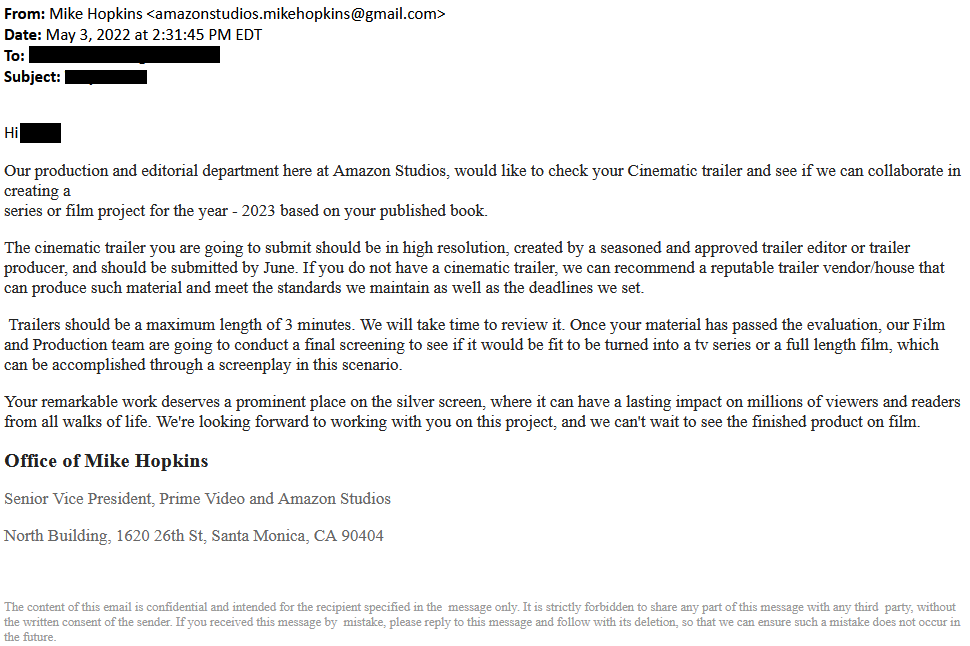
Once again, solicitation is the first warning sign. How likely is it that the head of a major production company like Amazon Studios is going to be reaching out to you personally? Not very. Also…
- Would a studio head really use a gmail address, rather than his company’s official email address (in this case, @amazonstudios.com)?
- If your work is so “remarkable”, wouldn’t “Mike” mention your title? And how he discovered it? Other than the author’s name in the salutation (which I’ve redacted), this email is totally generic.
- Most of the email is about the “cinematic trailer”, in which a real production company would have zero interest. Film rights aren’t optioned or sold based on 3-minute trailers provided by the author. Instead, this is what the scammer wants to sell you; they’re betting you don’t have a trailer just lying around, and will welcome a recommendation to the “reputable trailer vendor/house”, aka the scammer for whom this email is a front.
Costs for trailers vary depending on the company, but can run as high as $5,000. They are frequently of poor quality, with robo-voices and poorly-chosen stock images.
Here’s another one.
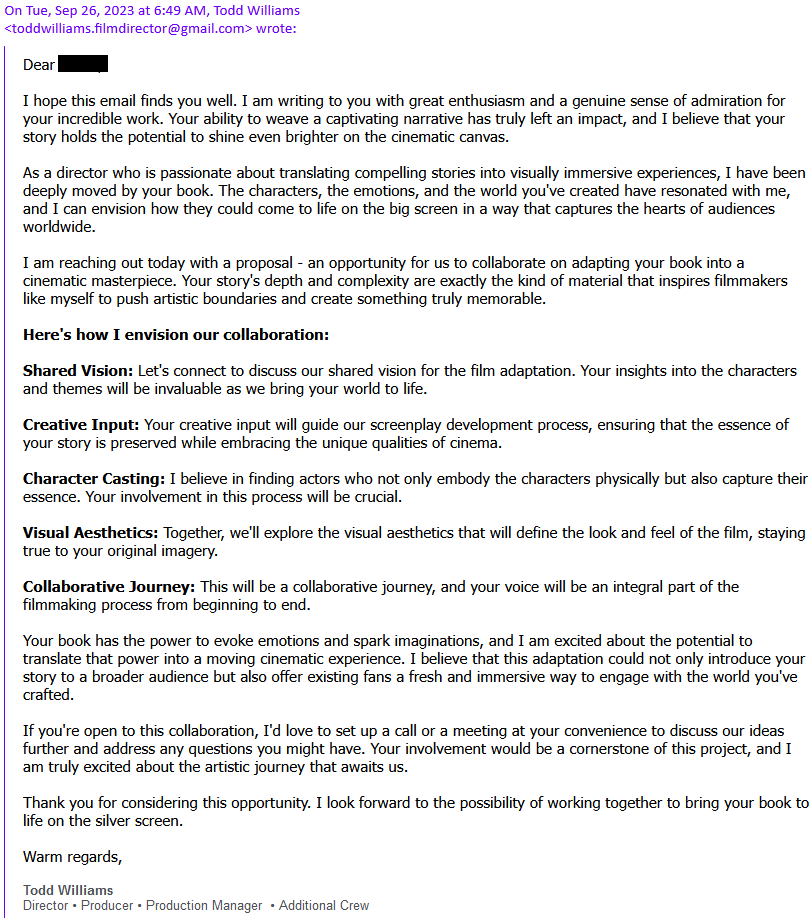
Todd Williams isn’t as well-known as Mike Hopkins and Amazon Studios, but he’s a real producer with a number of films and TV shows to his credit.
However, this email reeks of scam: the absurd email address (gmail again, and what actual film director makes “filmdirector” part of their user name?), the over-the-top yet completely generic praise that doesn’t even mention the name of the writer’s book, the absence of disclosure on where/how Fake Todd encountered the writer’s work.
What writer wouldn’t want to be approached by Netflix?.
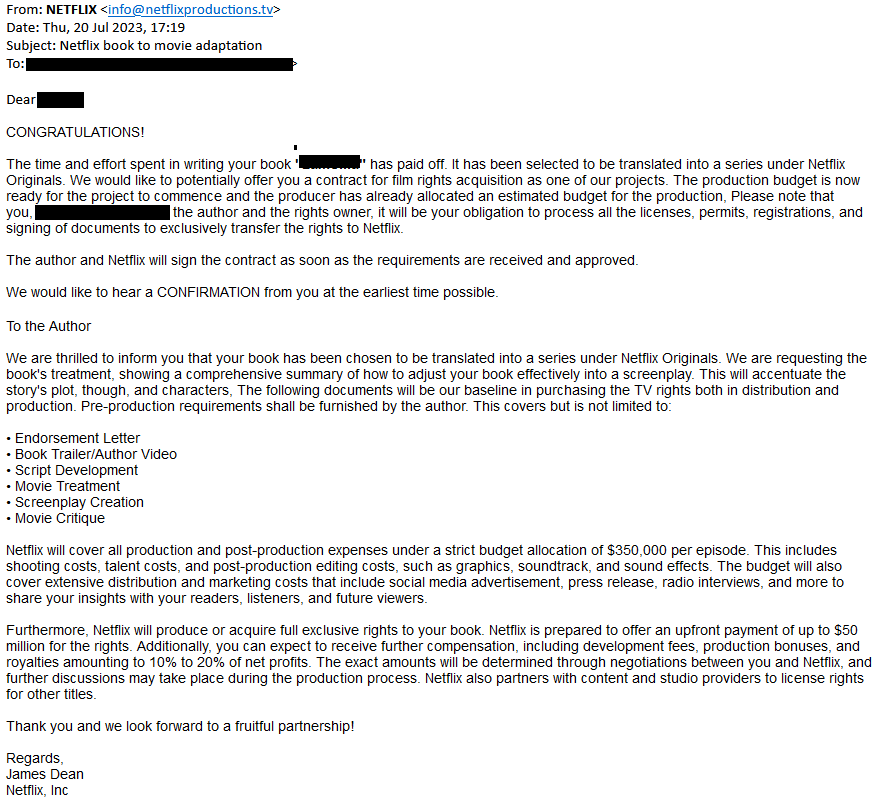
Caution signs (other than James Dean reaching out from beyond the dead):
- As in the examples above, there’s no word on how Netflix spotted the book or who “selected it” for acquisition. You can’t see it because of the redactions I’ve made, but the writer’s name and book title are in a different font, suggesting that they’ve been dropped into an email template.
- Instead of over-the-top flattery, there’s an over-the-top money promise: $50 million! Even most movie stars don’t earn that much. Big-money promises to turn writers’ heads are a time-honored scam technique.
- The email address, @netflixproductions.tv, is non-credible, given that Netflix’s main email domain is @netflix.com; plus, the email domain was less than a year old when the writer received this solicitation.
- Also note the list of “pre-production requirements”. Absolutely nothing on this list would be demanded by the real Netflix as part of an acquisition offer. If you’re ever lucky enough to sell film or TV rights (most likely via a reputable agent), the production company will pay you for them (there should never be a cost to you) and will then hire its own people to develop the script and create the screenplay.
The aim here was to sell the writer screenplay writing services, at a cost of $5,000 (quoted price: $10,000, with 50% supposedly “contributed” by the scammer). That’s actually fairly low for a screenplay scam; I’ve heard from authors who’ve paid as much as $20,000.
A different, but related scam: the entirely fictional film company.
HOW TO PROTECT YOURSELF
The examples above represent a tiny sliver of the hundreds of impersonation scams I’ve seen. There’s a lot of variation in technique and tactics, and while some are transparently bogus, others can be pretty professional-seeming and convincing.
Be skeptical. The first thing, always, is to remember that reputable literary agents, publishers, and film producers do not typically cold-call writers. For scammers, on the other hand, solicitation is the main way they acquire clients. Fulsome flattery should also make you suspicious, as should promises of big money. You can never say never in the writing business—but any publishing- or film rights-related solicitation should be treated with extreme caution.
Use the tips in this article. Investigate the sender’s email address. Check the agent’s or publisher’s website for impersonation warnings or information that doesn’t match the solicitation. Do you have to provide anything other than your manuscript (if so, do you have to pay for it)? Do a websearch—someone may have posted a question or complaint.
Plug the agent, publisher, or producer name into the search box of the Writer Beware blog. I’ve written several posts about impersonation scams, and update them regularly with new names.
Email Writer Beware. If I’ve heard something, I’ll tell you.
Have you encountered an impersonation scam? How did you identify it? Have you ever gotten an out-of-the-blue email from an agent or publisher that turned out to be authentic?










Hi Victoria, thank you for your service to the industry through Writer Beware and for the valuable examples and explanations in this post.
A self-published friend of mine bought into one of the movie scams some 15 years ago and—surprise, surprise—was informed of scheduling delays and then…nothing. All communication, conducted entirely through email after one phone interview, stopped.
Because what we do takes so much investment (time, education, emotional fortitude) up front, writers are gamblers and dreamers by necessity, and it makes me sick that some see us as a perfect population to exploit.
I’m bookmarking your post to pass along to friends and developmental editing clients. Writer beware, indeed.
Thanks for the kind words, and sorry to hear about your friend. The movie scams have been around forever–I was hearing about them in 1998, when Writer Beware was founded. Where there’s a dream, there are always predators ready to take advantage.
Thank you for this thorough and thoroughly disturbing description of what we should look for. The future looks bleak, however, with most of these warning signs being easily remedied. A scammer who reads this article, for instance, could clean up their act in an afternoon, and as AI develops, the telltale clumsiness will likely disappear too. Our smarts will have to match theirs.
Hello Victoria, and thank you. This investigation should be required reading for anyone contemplating self-publishing.
For me, a sense of sadness grew as I read your post. Serious writers who don’t win the musical chairs agent/publisher lottery turn logically to self-publishing. Along with them are thousands of others. These others have persuaded themselves–or been persuaded–that they can write. They are the fruit ripening on the tree of self-deception and dreaming. That’s how I think of those gullible enough to believe that agents, movie studios and Big Five publishers have beaten a path to their door. They are delighted to learn that their Young Adult novel about taro farming in Micronesia is slated for stardom. In the end, the problem is simple ignorance compounded by vanity. But in an age of scam artists and online hucksters, adults are more than ever responsible for doing their due diligence. As you make very clear, that applies with special emphasis to writers. After all, we’re in the business of imagining. That probably makes us more vulnerable to visions of sugar plums.
Ignorance and inexperience are a scammer’s best friends, it’s sadly true! I wish so many writers didn’t just jump into the deep end immediately, without taking the time to learn something about how the publishing and self-publishing businesses work (since the more you know about how things should work, the easier it is to recognize bad practice when you encounter it). That said, there is so much misinformation and flimflam on the internet that it can be extremely difficult to figure out who or what is a reliable source. It’s tough out there.
Con artistry probably has been around as long as humanity, but it’s now exponentially larger thanks to the internet. It’s not just publishing, either, which is why we have two-factor authentication and why it has been an Orwellian experience to obtain a Social Security number for my adopted daughter, among other things.
In our realm, the antidote is skepticism and education, which is why your work has been so heroic and invaluable, Victoria. Our industry and all authors owe you a debt of gratitude. As ever, thank you.
Thank you, Don–that means a lot. And yes–the internet 100% is the driver of scams today–not just as a scam enabler, but because of the massive amount of misinformation that’s out there. I probably spend as much time debunking publishing myths as I do on scam reporting.
If they come to you, it’s a scam.
I can’t say there are no exceptions to that, but it’s close. If an email isn’t actually written like someone genuinely *read* your work, if it isn’t from a friend of a business connection you actually have… you lose *very* little opportunity by trashing the email after a glance. And lose nothing by taking it with a barrel of salt.
What you wrote about imposters, implying that they are being de-masked by not behaving like “someone (who) genuinely *read* your work”, is very important.
Once, after a rejection, a young editor contacted me, praising my work and saying he’d work with me, help me for a fee. I turned him down. So much wrong about that situation.
Wow. Maybe not a scam, as such–but definitely unethical. Especially if whoever rejected you then passed your name on to the editor.
I had one recently using a real company in Canada. I looked up the company. They where in receivership and I’m sure unwilling to take a script from any new script writer. This “agent” wanted $10K for the “privilege” of representing me. I lead them down the primrose path until I got tired of him calling. When I called him out, the “agent” hung up on me. Can’t figure out why.
I learned a long time ago to send all those types of emails to spam. I don’t get many any longer. I learned after getting taken in as a new author that you are a target. Things I learned within a year: 1. No Agent or Publishing House is going to call or send and email to a self-published author unless they are selling a ton or books. 2. When the greeting is “exceptionally” formal, It’s a scam. ie “I hope I find you well.” That is from the 40s and 50s, not today. 3. If the email address they are using isn’t from the said company, I generally don’t go past the first line. 4. Big money quotes is always a lie. 5. If they are offering marketing/publicity–nope–not going there. Publicity is cheap to do and marketing your book is something they author needs to learn to do or, if in their contract, the company does for them.
You examples were great. I can’t seen and agent writing a 3-4 paragraph email to any one they don’t know.
Thank you for this article, and those who left replies. I was contacted today by The Literary House in Laguna Beach, California. “I hope you are well” etc. wanting to represent me with my current publisher Regency Publishers. I don’t mind sharing that Regency Publishers are based in the Philippines, pretending to be based in New York, with staff who speak English as a second language. They refuse to do what I ask which is to send me a link to my own book, Fun with Fables.
I’ve gotten a number of reports of solicitations from The Literary House. It’s on my list of overseas scams–part of a larger group that does business in the Philippines as Marken Dream Catchers. The Regency Publishers is part of the same group–so they’re trying to double-dip.
You are a gem, finding fraudsters and unraveling the scams of all kinds. That holds a great value to writers, but I hope that we shall also find ways to publish in a safe manner, i.e. without being targeted by criminals.
The one piece of advice I give writers that I think is most important: educate yourself about the publishing industry (that includes self-publishing) BEFORE diving into the publication process. The more you know about how things should work, the more easily you’ll be able to recognize scammers and bad actors when you encounter them. They won’t stop bothering you–but they’ll become a nuisance rather than a danger.
How to educate yourself? Jane Friedman’s site is a terrific resource for all things publishing and self-publishing–I recommend it a lot. The Writer Beware website (as distinct from the blog) also offers a ton of information and resources. And–very old-fashioned, I know–but there are many books on how to get published that can help, such as the For Dummies guides and Jeff Herman’s Guide to Book Publishers.
OK, but the market has -changed in many ways and we must find new ways to get our works published. The good, old ways of sending a script to a publisher and then waiting for months to see what he/she will do about it is not the only way these days. I think we need to upgrade the Indie industry and stop calling it “vanity presses”.
A million thanks for all you do to keep us safe from these predatory low-lifes, Victoria!
Another thing to watch out for is the endlessly iterative $20 promo sites. I fell for one once and it seems like a new site foisting the same wares crops up and emails me every week now under a different name. They result in no sales and no word of mouth traction, they just take your money and run
Agreed. These are becoming extremely common, and they solicit aggressively–I’m getting more and more questions about them. Yes, it’s cheap, but you get what you pay for–mostly, canned posts on low-engagement social media accounts that usually have many, many fewer followers than claimed (plus most of them are bots). Total waste of money.
Do you have a list of worthwhile promos? I have some that helped me, but I’m curious to compare notes.
I’m afraid not. In keeping with our mission, Writer Beware only collects and shares information on questionable/scam services and companies.
There is ONE advantage to being a “starving” artist or writer – you have no money to get scammed with, ha, ha! I love your web site – everything is so true. Last year, I did re-publish my book and actually accomplished it for $1K – it took a lot of work on my part but since I can only work an occasional shift at work and had so many health issues and am in my seventies – I had lots of time to take on the project. So, you cannot be scammed if you have no money to get scammed with. I am just happy and content when my readers truly enjoy my book and say, “WOW”. However, sometimes I do get upset when I see all the “garbage” best seller books out there and the equally boring movies – both of which are so unoriginal, illogical and poorly written. Growing up I learned so much from reading and taking free courses by correspondence whenever I could – sadly, our society is missing out when there are some incredibly well-written real-life stories that could teach us so much by the wealth of knowledge within the covers of such books.
Thank you so much, Victoria, for the wonderful service you provide.
BLESS YOU for the work you do, Victoria, in protecting authors. This is such a great guide to the latest scams–I’m sharing with authors in my newsletter.
Have I ever received a genuine offer from an agent or publisher I had not first contacted? Almost certainly not.
The funny thing is, though, that I have sent resumes and samples to educational publishers and heard nothing for up to a couple of years. Then when an offer comes in to my email, I’m suspicious and spend time tracking down the fact that I actually contacted them. (Usually I search the company part of the email address in my Gmail account and turn up what I sent them. But if they use an online form, I may have to find the notes in my query documents.)
I’m wary enough of scams that even when they’re offering me money to write a nonfiction book, I’m cautious. But it’s certainly better to be suspicious than get scammed!
It might not be a scam, but what to do for those who have used the original AS etc, with their high powered marketing to sell their expensive services to authors, with books published and out there being sold and receiving multiple awards, but very little royalties received? As for any of the other providers hawking their wares, several admitting to having previously worked for the original companies, just say no and report them to those original companies. And if any say they are from a film or streaming company etc offering an expensive deal, definitely say no and report them likewise. It helps to insist you have no money to invest – eventually they go away.
The AS imprints allow you to terminate your publishing agreement by written notice, so if you want to get free of them, it’s fairly easy to do. It takes a while for the book to become unavailable (I believe there’s a grace period where AS can continue selling), and Amazon won’t remove listings as long as there’s a third-party seller advertising the ISBN. but they do eventually take the book “out of print”.
I often hear from authors who see their AS book listed on dozens of online retail sites, and assume that this equates to sales. Unfortunately, it doesn’t. Retail listings don’t equal exposure: your book is listed among thousands or hundreds of thousands or millions of others, and the odds that readers will find it–or any other book–are small.
I self-published a book about personal finance, and now the scammers are trying to entice me with a movie deal, LOL.
That’s one common-sense way to identify a scam: if you’re being offered a movie deal or representation to Hollywood for a book that in no way is suitable for a movie. A personal finance book, for sure–but also illustrated children’s books. Netflix is not going to greenlight a movie based on your charmingly illustrated 20-page picture book about a curious squirrel learning life lessons.
When I was once approached by a scammer, I told them sure, I was interested and to please contact me at x address and phone number. I didn’t mention it was the contact info for the nearest FBI office.
Victoria, I’m coming late to this (busy weekend) but wanted to thank you for all you do for the writing community. My very first publication was with poetry.com 20 yrs ago and I wised up when they wanted to charge me $50 bucks for a book with some very bad poems (along with my own). I’ve since learned to do due diligence. I’ve had a reputable agent contact me after I won a short story contest–she was new and building her list. I wasn’t ready. I’ve done a lot of writing for hire in the school/educational world and get numerous solicitations to work on projects that I have no heart for, but it’s always interesting to see what the different companies are up to.
The last one regarding film and TV rights struck a nerve. Not because I was scammed, but because the reality is so different. In 1999, a comic book I made with a friend was optioned by Fox to be a TV series. I was the artist, my friend was the writer. The comic was Harsh Realm. Chris Carter (of X-Files fame) was the producer and head writer. The project was given a $100,000,000 budget for the full season and had a $7M pilot. At the time, that was a record.
I was working as an art director at Universal Studios when I was told about the project. Unfortunately, my publisher made the deal with Fox. There were no agents involved. My publisher, Harris Comics, was so stupid that they accepted a deal that gave me an amount equal to my day rate at Universal for each of thirteen episodes. In other words, the rough equivalent of a little overtime. The money was just about worthless to me because it wasn’t enough to change any particle of my life.
The only thing of value I could possibly get was a credit on the series. My publisher sold that to Fox also. In return for a separate payment to the publisher, they didn’t have to mention me or my partner in the credits. Instead, it gave credit to the publisher.
I instigated a lawsuit for false designation of trademark (a Lanham Act violation). The judge looked at opposing counsel and said, “Based on the documents submitted into evidence alone, without hearing any testimony, you have a 99% chance of losing. I suggest you settle.”
My partner was broke and begged me to settle for the amount they offered. He needed the money. It was more than I could afford to hand over to stay the course, so I settled to get it over with. To some people, we got a lot of money. To someone who has a job that requires any amount of education or experience, it was nothing. It was enough to buy a fancy bicycle, and that’s it.
As I wrote at the time, if I had to do it all over again, I would never let any publisher handle my work again. It was too easy for them to cheat. It didn’t matter because I had a good six figure salary and it kept getting bigger, right up until I caught someone misappropriating money from one of the companies I worked at. That discovery killed my career. After that, I had to ask myself if I was willing to go with a publisher again, just to put food on the table. I became a teacher instead.
I then earned a PhD from King’s College, London, and learned how to write. As part of that process, I learned about these fabulous people known as “agents.” Agents can protect creators from evil publishers. I don’t have an agent yet, but at least I know they’re out there.
Have you written your memoir yet? Don’t get an agent. Publish it as an indie, as the publisher, and retain all the rights.
Great research and article, Victoria! I’ve been using your helpful guidance since I started self-pubbing, way back when. I have never been scammed, thankfully, but I do get these types of letters in my email box from time to time. Luckily I have an agent, so if I was ever curious, I could forward to him. A thrilling part of my day when I get one of these scams is turning them in! I can’t wait to hit the “report” tab at the top of my hotmail box. As an author who also offers talks on writing, I always make sure to warn others. There are so many new writers who can be easily taken advantage of. It really breaks my heart.